

Barrister: Job description. Barristers (in England and Wales) are specialists in advocacy and represent individuals or organisations in court.

They are independent sources of legal advice and can advise clients on their case. Generally, they are hired by solicitors to represent a case in court and only become involved once advocacy before a court is needed. They plead the case on behalf of the client and the client's solicitor. Barrister Job Information. Page Content Barrister Hours37-40+ per weekStarting salary£12,000 + per year Barristers give specialist legal advice to solicitors and other professional clients.
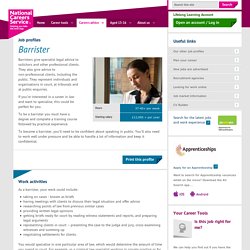
They also give advice to non-professional clients, including the public. They represent individuals and organisations in court, at tribunals and at public enquiries. Pupillages, mini-pupillages and graduate jobs in law. Becoming a barrister. Frequently asked questions. 1.
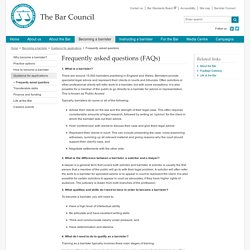
What is a barrister? There are around 15,500 barristers practising in England and Wales. Visit to Lincolns Inn June 2014. How to become a barrister. The steps typically taken to become a barrister involve three main stages of training: Academic Stage: an undergraduate degree in law (LLB), or an undergraduate degree in any other subject followed by the conversion course Vocational Stage: the Bar Professional Training Course (BPTC), which entails one year of full time study or two years' part time studyPupillage: one year spent as a pupil in barristers' chambers or in another organisation approved by the Bar Standards Board as a Pupillage Training Organisation (PTO) .
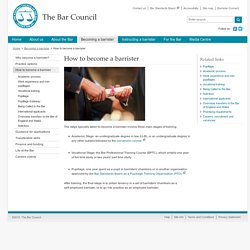
Becoming a barrister - key points. Grays Inn University Advocacy Day .docx. University of Leeds Careers Centre Blog. Fancy yourself as the next Atticus Finch?

Career Consultant Steve Carter shares his top advice for aspiring barristers. All of the below is taken from talks given by both junior and senior barristers as well as serving judges. What do Barristers do? In essence a barrister ‘crafts legal arguments to persuade a jury/judge of the efficacy of their case. Barristers have to be practical; can the problem be solved any other way? Away from self-employment there are government barristers working for the Government Legal Service. There are also other public bodies such as the police and local government. In the private sector large organisations such as banks will have their own in-house legal team which will usually be headed up by a barrister.
The work is varied depending on the area of law practiced. The call to the Bar. Advice for applications. Becoming a barrister is fiercely competitive.
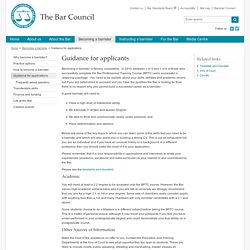
In 2010, between 1 in 5 and 1 in 6 of those who successfully complete the Bar Professional Training Course (BPTC) were successful in obtaining pupillage. You need to be realistic about your skills, abilities and academic record, but if you are determined to succeed and you have the qualities the Bar is looking for then there is no reason why you cannot build a successful career as a barrister. A good barrister will need to: Have a high level of intellectual ability Be articulate in written and spoken English Be able to think and communicate clearly under pressure, and Have determination and stamina.
Below are some of the key ways in which you can learn some of the skills that you need to be a barrister and which will also assist you in building a strong CV. Please see the timetable and checklist. You will need at least a 2.2 degree to be accepted onto the BPTC course. K1 K2 Terminology for students interested in a career in Law. Bar Professional Training Course. Those chasing a career at the Bar face the prospect of being well trained and highly qualified, but with little more than a £15k-sized hole in their pockets to show for it.
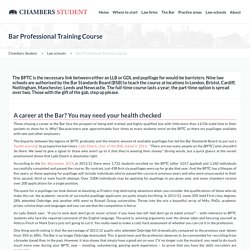
Why? Because every year approximately four times as many students enrol on the BPTC as there are pupillages available with sets and other employers. The disparity between the legions of BPTC graduates and the miserly amount of available pupillages has led the Bar Standards Board to put out a 'health warning' to prospective barristers. Lady Deech, chair of the BSB, stated in 2011: "There are too many people on the [BPTC] who shouldn’t be there. We need to give a signal to those who aren’t up to it that they’re wasting their money.
" According to the Bar Barometer 2014, in 2011/12 there were 1,732 students enrolled on the BPTC (after 3,017 applied) and 1,260 individuals successfully completed and passed the course. Students wishing to enrol on the BPTC must first pass the Bar Course Aptitude Test or BCAT. Cost Location. Statistics. Annual data refers to the situation in December of that year.
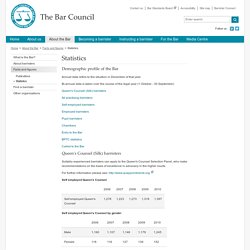
Bi-annual data is taken over the course of the legal year (1 October - 30 September) Queen's Counsel (Silk) barristers. Barristers' practice areas. By saying 'I am a lawyer' you can mean many different things.

As a barrister, you probably work for yourself in a set of chambers, but you could work for a government body or even for a company. And even within those categories, the work you do can vary widely. In reality, few cases lend themselves to rigid categorisation or fit neatly into traditional categories. What at first appears to be a company law problem could raise issues pertaining to banking, insolvency or insurance law.
Accordingly, the majority of chambers undertake varied work. Each discipline has its own demands relating to knowledge, temperament, working practices and remuneration. Law.